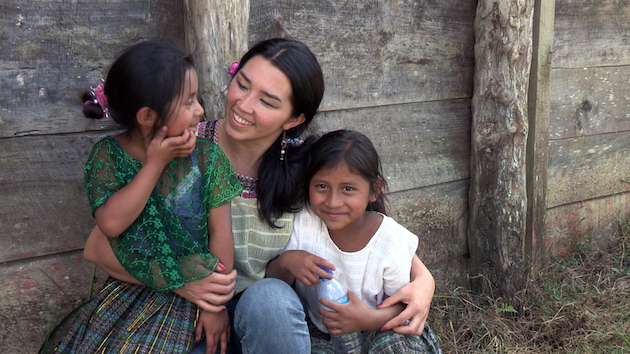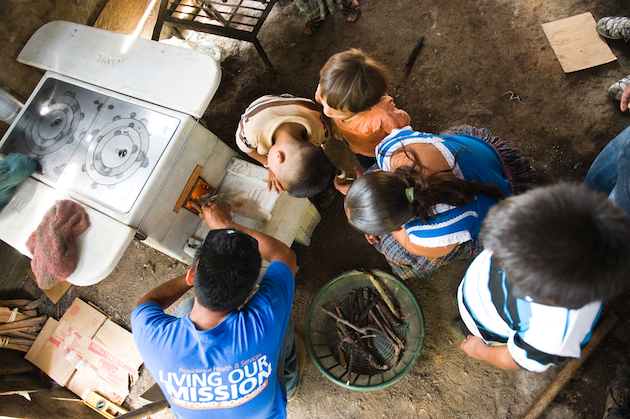Having lived and worked overseas, I learned to think broadly about world issues, including poverty, access to basic resources, and disparities in health care. The busyness of life can make it easy to focus inward. But the global needs are great, which is why I am passionate about sharing with you how Providence St. Joseph Health is going beyond our borders to address health disparities, particularly in the communities of Guatemala. Aimee Khuu, Executive Director of Global and Domestic Partnerships at Providence St. Joseph Health, talks about the partnership between the organization and the Chicaman community, how they are working to address issues like child malnutrition, and the global impact of their efforts.

Can you talk about how the partnership between Providence St. Joseph Health and Chicaman, El Quiche began?
The causes of disability and disease around the globe are many but there are several key drivers: poverty, malnutrition, and lack of access to clean water or appropriate medical care. At Providence St. Joseph Health, our Mission reaches beyond our borders to respond to the root causes of health disparities. In 2012, we set out on a journey to find out where we could make the most meaningful impact to address immediate health needs while also building toward sustainable solutions. We identified Guatemala through a discernment process and needs assessments throughout international partners. The Chicaman community, in particular, includes 35,000 people living in extreme poverty where preventable illnesses are the leading causes of death for children. The survey also informed us that access to adequate medical care in the remote region is limited, with a handful of poorly-equipped health outposts and only one doctor for every 10,726 residents.
What are the key issues/problems that were identified and are now being addressed through this partnership?
We were inspired to launch a three-year strategic plan to improve key health indicators, including:
- Reduce child malnutrition by half
- Decrease diarrheal disease by half
- Increase prenatal care
- Strengthen health system delivery for 35,000 residents
How is Providence St. Joseph Health positioned to address these needs?
Leveraging our unique scale and resources, our multipronged programs in Guatemala are structured around three strategic pillars that include public health solutions, medical relief, and health system development through education and supplies.
To relieve suffering from urgent health issues, our clinicians travel to local hospitals and villages multiple times throughout the year to provide surgical and medical services. Providence is also providing desperately needed medical supplies and equipment through our medical supply recovery program. Our public health interventions include the installation of ventilated cooking stoves, sanitary latrines and clean water projects.
To create lasting change, we established a relationship with the Universidad de Rafael Landivar to build a robust medical education exchange program that provides opportunities for residents and students to serve in both countries.
Is this a volunteer-based program? If so, how are the volunteers selected? What type of training/experience is required?
Since 2012, more than 1,600 of our employees and executives have traveled internationally to serve and contribute to improved health for vulnerable populations. Service opportunities are open to all employees of Providence St. Joseph Health. The ideal team member would be someone who is committed, flexible, adaptable under challenging circumstances, and comfortable working with a diverse team on which all members are considered valuable peers.
Selected volunteers participate in 3 pre-trip orientation meetings, reflections in-country, and debrief gatherings following the trip. Additionally, volunteers are asked to pay a portion of the travel and in-country costs to Guatemala, help fundraise $1,000 for their service project, and use their PTO to participate. A limited number of scholarships are available to help off-set trip costs for caregivers with financial need.

What has been the impact so far?
The results have been outstanding; with a decrease in the leading causes of death for children under the ages of 2 in the communities we serve and powerful impact on our caregivers with 97% of participants more closely connected to the mission and values of our organization. Together with our in-country and partners and volunteers, our impact to date includes: strengthening of the local health facilities, improving the home environment for vulnerable families- including access to clean water, sanitary latrines and clean burning stoves as well as the provision of surgical and medical care. We have reduced the leading causes of death by more than half.
At its root, our work in Guatemala is meant to give the people who work for PSJH an opportunity to learn and grow by working among those who are poor and vulnerable. We have come to learn that this kind of end-to-end transformation is felt through the caring heartbeat of our ministry. Time and again, caregivers who have traveled to Guatemala, or on other service trips, speak about the way it has transformed them – their personal perspective, their work and their assumptions.
Are there any plans to expand the program to other communities?
We have expanded programs in both Mexico and Malawi.
What are the challenges volunteers face?
For many volunteers, this is the first time they are traveling outside the United States. For others, they have participated on other service trips and traveled internationally extensively and so their personal challenges are varied and broad. That being said, for each volunteer, their experience is both eye opening and challenging. Seeing poverty for the first time, knowing that you are limited what you can provide, and then returning home – I would say that the challenges can be quite significant and yet at the same time transformative in very positive ways.
How does the team incorporate the culture and practices of this population while working to help improve health outcomes?
We never assume to know what a community needs. By working together with community members who define – from their unique cultural vantage point – what is most needed and how to make it happen, we in turn provide them with opportunities to lead the way in improving their own lives. The most effective programs are centered on community participation and empowerment.
How long is the program and what indicators are used to measure success?
Our work has made significant impact in the communities we serve. Over the past few years:
- The incidence of diarrhea in children under 2 years old has reduced from 41% to 17%
- Practices related to safe water consumption, hand washing and sanitation has improved from 3% to 80%
- Underweight children under 2 years old has reduced from 35% to 27%
- Pneumonia rates for children under 2 years old has reduced from 25% to 7%
What can be learned from working with Guatemalan clinicians and the community they serve?
Our university partner in Guatemala has an innovative model of health delivery that involves door-to-door surveying and mapping of health risks. It is truly population health in action. In the U.S., Guatemalan medical students get their first experience with the family medicine model and participate in integrated, multidisciplinary care teams. We have much to learn from each other, and over time, hope to achieve a sophisticated level of expert-to-expert collaboration that will inspire the next generation of doctors and nurses and help us better serve our patients.
I invite you to learn more about the partnership between Providence St. Joseph Health and the Chicamán community by visiting their website and following them on Facebook and Instagram.
- Discover Luxury at Sonesta Irvine: Your Ideal Staycation - August 8, 2024
- CHOC Walk Returns to the Disneyland Resort – Special Events and Ways to Support - June 28, 2023
- Beastly Ball Returns to the Los Angeles Zoo - May 8, 2023

Leave a Reply